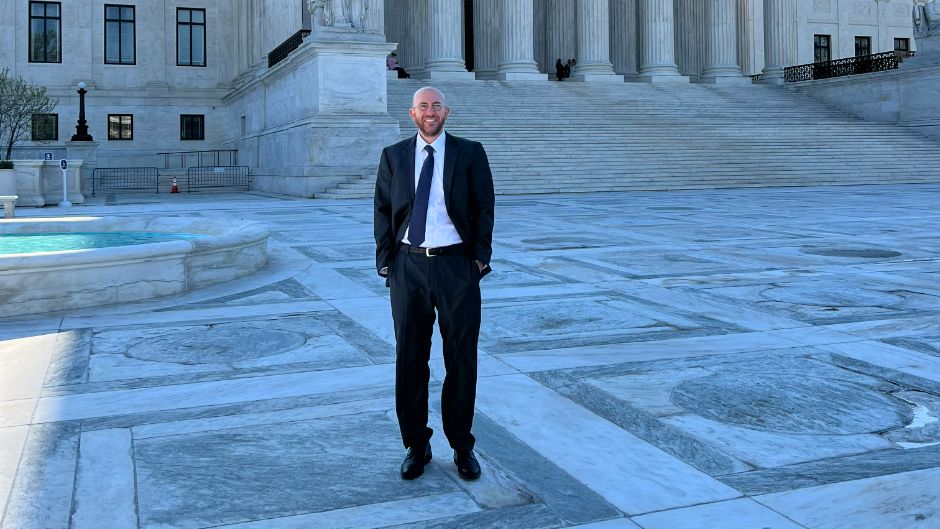Assistant Federal Public Defender Andrew Adler sat third chair in a Supreme Court case back when he was an attorney at Boies, Schiller & Flexner LLP in a class action securities fraud case against Haliburton. After joining the appellate division of the Federal Public Defender's Office for the Southern District of Florida in 2015, he would second-chair two more Supreme Court cases before his first-chair hat trick in 2021, 2022, and 2023.
Adler, a criminal law expert, is aware of only a couple of public defenders in history who have argued three U.S. Supreme Court cases over the course of long careers, but he is unaware of any who have done so in three calendar years.
The 2007 Miami Law grad's first appearance was early in the pandemic and was conducted by telephone from his home. "Obviously the Court was doing the best it could under extraordinary circumstances, but the experience felt a bit artificial," he said. "Each Justice had a three-minute segment to question so if, hypothetically, Justice Breyer talked for 2-and-a-half minutes, I only had 30 seconds to respond. And of course, the lawn guys decided to come that morning!"
His 2022 case was in the courtroom but closed to the public.
Adler's most recent argument, however, occurred in a packed courtroom. That case before the Justices centers on the Armed Career Criminal Act, which imposes a mandatory 15-year sentence on a person convicted of unlawfully possessing firearms if they had already committed three violent felonies or serious drug offenses. The issue's crux was determining which drug offenses count under the law.
Road to Miami Law
The 41-year-old grew up in the Main Line suburbs of Philadelphia, attending Lower Merion High School, famous for being the late Kobe Bryant's alma mater. Adler has lawyers in his family (he is the son of a now semi-retired patent attorney, and his uncle is also an attorney). "There was no pressure to direct me toward law," he said. "It was just kind of where I naturally drifted."
A couple of incidents as a teenager likely cemented his interest in criminal defense. The first was being falsely accused of writing defamatory graffiti about his bar mitzvah tutor. Fortunately, his parents believed in his innocence, his bar mitzvah was allowed to proceed, and he became a "man," he said. (Decades later, the actual perpetrator confessed.)
The second experience was more general. The local police force was well funded and resourced but sometimes had little actual crime to police. "I guess one might say they mildly harassed teenagers who were driving around in the area," he said. "They were ruthless about hiding out setting up speed traps and things like that.
"I had a couple of interactions after being pulled over for minor infractions—like making a right on a 'no turn on red' or not coming to a complete stop at a stop sign," he said. "As a teenager, it can be quite scary to be pulled over by police, though it obviously pales in comparison to excessive force incidents that we hear about today. I think these experiences had a subconscious effect on me and made me interested in criminal defense."
At Emory University, he enrolled in a pre-law course on unreasonable searches and seizures. "I thought, 'yeah, this Fourth Amendment thing is really interesting. I can relate to this.'"
As a child, Adler had spent time in South Florida visiting his grandmother in a suburb of Fort Lauderdale. Even though he had applied to law schools nationwide, Miami Law made financial sense; the weather was lovely, and he was close to Grandma Sandy.
"I had a very positive experience in law school. And like a lot of people, I enjoyed it. It kind of clicked for me," he said. "It probably took me a semester before I figured out what was going on, but I found most of my courses interesting. I also came away with some basic legal knowledge that I wouldn't have had otherwise in subjects like corporations and trusts and estates, which I do not use in my current practice at all but have used in my life. And, not that it ever really saved me, but it's nice to know about federal maritime law."
At Miami Law, Adler participated in a summer abroad program in Spain, which he highly recommends. He also served as a research assistant with Professor Stephen Urice, an early mentor with whom he later co-taught a seminar and co-authored a law review article before going on to serve as a law clerk for three federal judges: Rosemary Barkett (retired) and Peter Fay (deceased), both of the 11th Circuit; and Kathleen Williams, J.D. '82, of the Southern District of Florida, who is currently active.
"When I was a student at Miami," he said, "the idea of arguing before the Supreme Court did not even remotely cross my mind as a possibility, let alone something I aspired to do. The Supreme Court bar today consists of truly brilliant lawyers that come mostly from the nation's top law schools. Many have clerked for justices on the Supreme Court, and many of them work in top law firms or in the Solicitor General's Office. It's a very distinguished and talented group that is all but impossible for outsiders to break into.
"So, I would say to current students, you never know where your career is going to take you. And if you are interested in criminal defense, I would highly recommend working as a public defender. It is one of the few places to gain in-court experience after law school, and it serves a vital public interest. Who knows, one day you could one day find yourself trying a high-profile trial that is covered in the press. Or you could find yourself arguing before the United States Supreme Court," Adler said.

